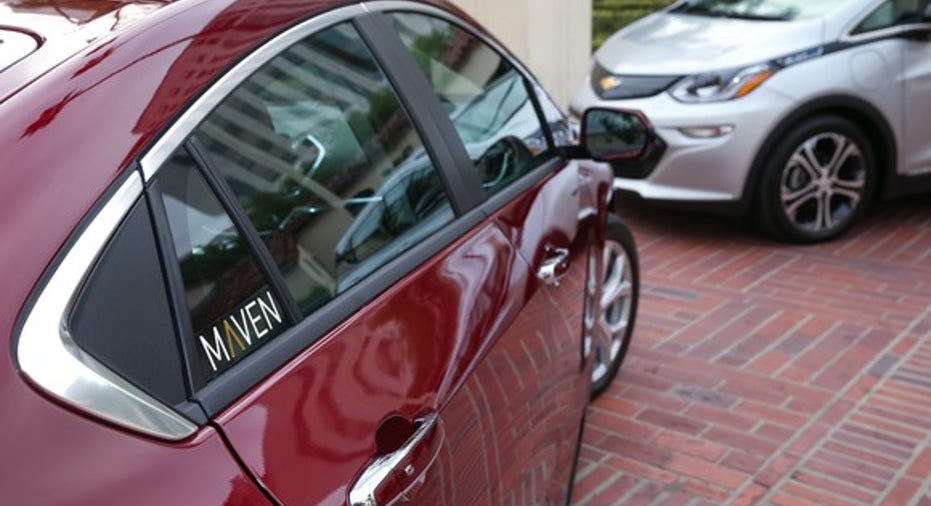Is General Motors' New Deal With Uber a Stab in Lyft's Back?

In a new pilot program, GM's Maven unit will lease vehicles to Uber drivers in San Francisco at a discounted weekly rate. Image source: General Motors.
General Motors (NYSE: GM) announced on Nov. 1 that its Maven car-sharing unit has struck a deal with ride-hailing giant Uber Technologies to provide discounted short-term leases on GM vehicles to Uber drivers.
Wait a minute -- doesn't GM own a chunk of Uber's arch-rival Lyft?
GM owns about 9% of Lyft, Uber's principal ride-hailing rival in the United States. GM invested $500 million in Lyft in January, GM's president sits on Lyft's board, and GM and Lyft are working on a series of programs together.
In fact, this new program with Uber is very similar to one that GM set up for Lyft's drivers earlier this year. But GM doesn't see any reason for Maven not to lease cars to drivers working for Lyft's rival. And apparently Lyft doesn't mind. A Lyft spokesperson told Forbes, "Maven's supply channels do not impact our programs with GM. We continue to work together to shape the future of mobility." (Lyft's spokespersondidn't immediately respond to a request for comment.)
What is this new program with Uber?
Like the Express Drive program that GM set up with Lyft, the new program with Uber is intended as a way for drivers who don't have a suitable vehicle to lease one at a discounted rate.
The deal with Uber is a 90-day pilot program that will run in San Francisco. Here's how GM described it:
That's a little more expensive than the $135 weekly rate for a Cruze in the Express Drive program, which is partially subsidized by Lyft. And while it sounds expensive compared to a traditional new-car lease deal, remember that the terms are weekly -- and that maintenance and insurance are covered.
The program (again, like Lyft's) will be run via Maven, GM's "personal mobility brand." Maven runs a fast-expanding network of car-sharing programs that are currently operating in nine U.S. cities. One of those is San Francisco, where Maven arrived in October -- and it's Maven's San Francisco unit that will operate the pilot program with Uber.
Why is GM interested in this kind of business?
Like its deal with Lyft, working with Uber gives GM a look at a business that could be a "disruptive" competitor in time -- and a chance to build a friendly and profitable business relationship before that happens.
It's also -- and this is important -- a way for GM to do something with its off-lease and former rental-fleet vehicles other than putting them up for auction. Reducing the number of late-model GM vehicles that hit the used-car market will help boost the values of other used GM vehicles.
GM cares about used-car values because new-car leases are priced based on the vehicle's expected "residual value" at the end of the lease term. Higher used-car values allow GM to offer more competitive lease deals on its new models. (This is one of the reasons why GM has been reducing its sales to rental-car fleets, by the way.)
GM isn't being coy about that motivation. Here's what GM's vice president of urban mobility, Julia Steyn, said about the deal in a statement:
What's next for GM and Uber?
Right now, the program is just a 90-day pilot in one city, San Francisco. But assuming it goes well, it's very possible that it will be rolled out on a larger scale -- at the very least, in the other U.S. cities where Maven has a presence.
A secret billion-dollar stock opportunity The world's biggest tech company forgot to show you something, but a few Wall Street analysts and the Fool didn't miss a beat: There's a small company that's powering their brand-new gadgets and the coming revolution in technology. And we think its stock price has nearly unlimited room to run for early in-the-know investors! To be one of them, just click here.
John Rosevear owns shares of General Motors. The Motley Fool recommends General Motors. Try any of our Foolish newsletter services free for 30 days. We Fools may not all hold the same opinions, but we all believe that considering a diverse range of insights makes us better investors. The Motley Fool has a disclosure policy.



















